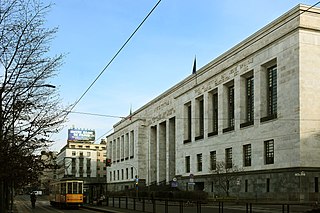Related Research Articles
Administrative law is a division of law governing the activities of executive branch agencies of government. Administrative law includes executive branch rule making, adjudication, and the enforcement of laws. Administrative law is considered a branch of public law.
Combinatorics is an area of mathematics primarily concerned with counting, both as a means and as an end to obtaining results, and certain properties of finite structures. It is closely related to many other areas of mathematics and has many applications ranging from logic to statistical physics and from evolutionary biology to computer science.

In computer science, a data structure is a data organization, and storage format that is usually chosen for efficient access to data. More precisely, a data structure is a collection of data values, the relationships among them, and the functions or operations that can be applied to the data, i.e., it is an algebraic structure about data.

In a positive connotation, a hacker is a person skilled in information technology who achieves goals by non-standard means. Though the term hacker has become associated in popular culture with a security hacker – someone with knowledge of bugs or exploits to break into computer systems and access data which would otherwise be inaccessible to them – hacking can also be utilized by legitimate figures in legal situations. For example, law enforcement agencies sometimes use hacking techniques to collect evidence on criminals and other malicious actors. This could include using anonymity tools to mask their identities online and pose as criminals. Likewise, covert world agencies can employ hacking techniques in the legal conduct of their work. Hacking and cyber-attacks are used extra-legally and illegally by law enforcement and security agencies, and employed by state actors as a weapon of legal and illegal warfare.
A hate crime is crime where a perpetrator targets a victim because of their physical appearance or perceived membership of a certain social group.

The Pareto principle states that for many outcomes, roughly 80% of consequences come from 20% of causes.
In law, a witness is someone who, either voluntarily or under compulsion, provides testimonial evidence, either oral or written, of what they know or claim to know.
The Resource Description Framework (RDF) is a World Wide Web Consortium (W3C) standard originally designed as a data model for metadata. It has come to be used as a general method for description and exchange of graph data. RDF provides a variety of syntax notations and data serialization formats, with Turtle currently being the most widely used notation.
In a legal dispute, one party has the burden of proof to show that they are correct, while the other party has no such burden and is presumed to be correct. The burden of proof requires a party to produce evidence to establish the truth of facts needed to satisfy all the required legal elements of the dispute.

Luca Zaia is an Italian and Venetist politician, who has been President of Veneto since 2010, and a historical member of Lega Nord, other than being the most progressive member of his own party. Supporter of initiatives to tackle climate change, gender-affirming surgery, the recognition of transgender people to identify with their preferred sex, and main protagonist of the fight against homophobia and antisemitism, he often rose to prominence for his positions contrasting the lines of his own party, in particular for the ones concerning the welcoming of immigrants and his model of "integrazione diffusa" of migrants coming to Europe.

Inter Milan Youth Sector is the youth set-up of Italian professional football club Inter Milan. The under-19 team plays in the Campionato Primavera 1. They have been Italian champions ten times, Coppa Italia Primavera winners five times and have also won the Supercoppa Primavera on one occasion. They also participate in the annual Torneo di Viareggio, an international tournament which they have won six times.
Manslaughter is a common law legal term for homicide considered by law as less culpable than murder. The distinction between murder and manslaughter is sometimes said to have first been made by the ancient Athenian lawmaker Draco in the 7th century BC.
The FAO geopolitical ontology is an ontology developed by the Food and Agriculture Organization of the United Nations (FAO) to describe, manage and exchange data related to geopolitical entities such as countries, territories, regions and other similar areas.

The judiciary of Italy is composed of courts responsible for interpreting and applying the law in the Italian Republic. Magistracy is a public office, accessible only to Italian citizens who hold an Italian Juris Doctor and have successfully participated in the relevant competitive public examination organised by the Ministry of justice. The judicial power is independent and there is no internal hierarchy within. Italian magistrates are either judges or public prosecutors.
The law of Vatican City State consists of many forms, the most important of which is the canon law of the Catholic Church. The organs of state are governed by the Fundamental Law of Vatican City State. The Code of Penal Procedure governs tribunals and the Lateran Treaty governs relations with the Italian Republic.

The law of Italy is the system of law across the Italian Republic. The Italian legal system has a plurality of sources of production. These are arranged in a hierarchical scale, under which the rule of a lower source cannot conflict with the rule of an upper source.

Montorio is a village in Tuscany, central Italy, administratively a frazione of the comune of Sorano, province of Grosseto, in the tuff area of southern Maremma.

Limited traffic zone (LTZ) is type of restricted traffic area found in many historic European city centres where non-residents and unauthorized vehicles are prohibited from driving at certain times. These areas are relatively abundant in Italy, where they are called zona a traffico limitato (ZTL), but they also exist in Spain, Portugal, France and Poland with different names. Around 350 Italian cities have LTZs, and 250 have low-emission zones (LEZs), usually enforced with camera surveillance. They help protect historic city centres from excessive traffic, which would otherwise make the city less attractive. They can also be aimed at limiting pollution levels or at increasing administrative revenue by paying an urban toll.
The Italian public administration, in the Italian legal system, indicates the set of public bodies belonging to the public administration of the Italian Republic.
The principle of legality in French criminal law holds that no one may be convicted of a criminal offense unless a previously published legal text sets out in clear and precise wording out the constituent elements of the offense and the penalty which applies to it. (Latin:Nullum crimen, nulla pœna sine lege, in other words, "no crime, no penalty, without a law").
References
- ↑ "Tipicità | La Legge per tutti" (in Italian). Archived from the original on 2017-05-24. Retrieved 2021-02-07.
- ↑ Themelize.me. "Guida a Open Graph". www.tesionline.it (in Italian). Archived from the original on 2021-02-07. Retrieved 2021-02-07.
- ↑ Grimaldi, Ilaria (2020-05-06). "Il principio di proporzionalità della pena nel disegno della Corte Costituzionale". Giurisprudenza penale (in Italian). Archived from the original on 2021-02-07. Retrieved 2021-02-07.
- ↑ Themelize.me. "Guida a Open Graph". www.tesionline.it (in Italian). Archived from the original on 2021-02-07. Retrieved 2021-02-07.
- ↑ "Provvedimento, tipicità". www.exeo.it (in Italian). Archived from the original on 2020-09-26. Retrieved 2021-02-07.